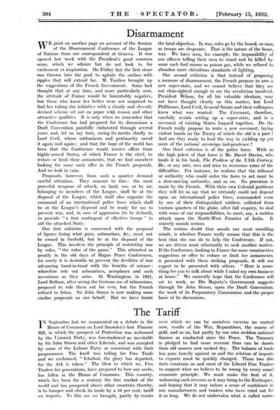Disarmament
WE print on another page an account of the Session of the Disarmament Conference of the League of Nations from our correspondent at Geneva. It was opened last week with the President's good common sense, which we admire but do not look to for excitement or inspiration. On Friday last the first stone was thrown into the pool to agitate the surface with ripples that will extend far. M. Tardieu brought up the suggestions of the French Government. Some had thought that at any time, and more particularly now, the attitude of France would be lamentably negative, but those who know her better were not surprised to find her taking the initiative with a clearly and cleverly devised scheme set out on paper with reason and other attractive qualities. It is only when we remember that the Conference has had prepared for its discussions a Draft Convention painfully elaborated through several years and, let us say here, owing its merits chiefly to Lord Cecil, whose enthusiasm and pertinacity saved it again and again ; and that the hope of the world has been that the Conference would receive offers from highly-armed States, of which France is the chief, to reduce or limit their armaments, that we find ourselves looking for some such offer in the French proposals. And we look in vain.
Proposals, however, from such a quarter demand careful attention. They amount to this : the most powerful weapons of attack, on land, sea, or by air, belonging to members of the League, shall be at the disposal of the League, which shall also organize the command of an international police force which shall be at the League's disposal and be ready for use to prevent war, and, in case of aggression (to be defined), to provide " a first contingent of effective troops " to aid the attacked State.
Our first criticism is concerned with the proposal of figures fixing what guns, submarines, &c., must not be owned in freehold, but be at the disposal of the League. This involves the principle of restricting war by rules, " the rules of the game." This attracted us greatly in the old days of Hague Peace Conferences, for surely it is desirable to prevent the devilries of war advancing hand-in-hand with the benefits of. science.: wherefore rule out submarines, aeroplanes and such inventions as they arise. At Washington, in 1921, Lord Balfour, after seeing the German use of submarines, proposed to rule them out for ever, but the French refused to listen. Sir John Simon is now making some similar proposals on our behalf. But we have learnt
the fatal objection. In war, rules go by the board, so soon as troops are, desperate. That is the nature of the beast, war. We have seen, for example, the_ impossibility, of our officers telling their men to stand and be killed by some such foul means as poison gas, while we refused to abandon more chivalrous standards of fighting.
Our second criticism is that instead of, proposing a measure of disarmament, the French propose to arm a new super-state, and we cannot believe that they are not clear-sighted enough to see the revolution involved. President Wilson, for all his valuable idealism, may not have thought clearly on this matter, but Lord Phillimore, Lord Cecil, General Smuts and their colleagues knew what was wanted. The Covenant, therefore, carefully avoids setting up a super-state, and is a covenant of existing States leagued together. . Do the French really propose to write a new covenant, laying violent hands on the Treaty of which the old is a part ? And are they ready to lead the way in yielding up yet more of the nations' sovereign independence ?
Our third criticism is of the police force. With us the high priest of that force is Mr. David-Davies, who lauds it in his book, The Problem of the XXth Century. He, at any rate, sees and tries to overcome some of the difficulties. For instance, he realizes that the, tribunal or authority who could order the force to act must be a slow-moving authority, and so on. No provision is made by the French. With their own Colonial problems they will let us say that we certainly could not depend upon an international police force, commanded even by one of their distinguished soldiers, collected from various quarters of the globe, after full enquiry, to deal with some of our responsibilities, to meet, say, a sudden attack upon the North-West Frontier of India. It scarcely sounds serious.
The serious doubt that assails our most unwilling minds, is whether France really means that this is the best that she can do to help the Conference. If not, we are driven most reluctantly to seek another motive. If the Conference, looking to France for some constructive -suggestion or offer to reduce or limit her armaments, is presented with these striking proposals, it will not expect to be presented with others.• " Here is some- thing for you to talk about while I mind my own business at home." We earnestly hope that the Conference will set to work, as His Majesty's Government suggests through Sir John Simon, upon the Draft Convention, the work of its Preparatory Commission and' he proper basis of its discussions.






































 Previous page
Previous page